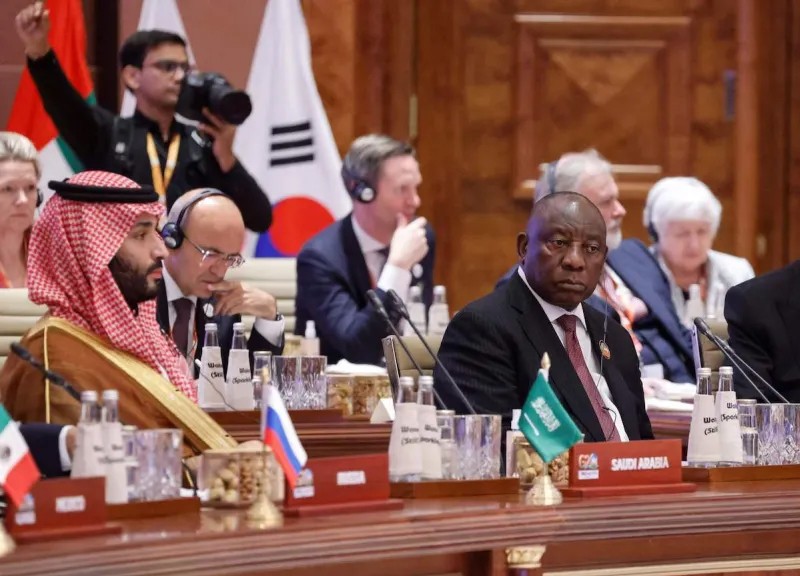
Mohammed bin Salman is touting debt relief and conflict mediation to spread Riyadh’s influence on the continent.
By Nosmot Gbadamosi, a multimedia journalist and the writer of Foreign Policy’s weekly Africa Brief. - Foreign Policy
The highlights this week: Darfur violence intensifies in Sudan, tensions between Ethiopia and Eritrea mount, and Kenya announces the cost of its planned Haiti deployment.
Riyadh hosted African leaders last Friday at the first Saudi-Africa summit on fostering trade ties. Among other measures, Saudi Crown Prince Mohammed bin Salman proposed $10 billion to finance and insure Saudi exports through 2030 and an additional $5 billion in development financing for African nations.
Saudi Arabia is touting both debt relief and conflict resolution to African nations. This month, Riyadh has attempted to mediate peace negotiations between Sudan’s warring generals. And an ambitious blueprint to invest a total of about $25 billion in Africa by the end of the decade was recently unveiled, in fields ranging from clean energy cooperation and counterterrorism to climate change response and cheaper financing.
Back in 2020, during its G-20 presidency, Saudi Arabia had called for the suspension of African debt service payments.
Now Riyadh is starting to put those plans into action. The Saudi Development Fund signed a conservative 2 billion riyals ($533 million) worth of deals with Arab and African governments during the Saudi-Arab-African Economic Conference, which was held ahead of the Nov. 10 summit. “We are working with partners to support Ghana and other countries regarding their debt,” said Saudi Finance Minister Mohammed Al-Jadaan.
Security experts say that the global energy crisis following Russia’s invasion of Ukraine in February 2022 has provided Saudi Arabia with an opportunity to strengthen its influence and become less reliant on Washington.
As Persian Gulf analyst Anna Jacobs writes, “the new approach is also informed by Saudi perceptions that the U.S. has become unreliable in its longstanding de facto role as a guarantor of Gulf security, putting more pressure on Saudi statecraft to create a geopolitical climate that is conducive to its goals and interests.”
The linchpin of the crown prince’s approach is Vision 2030, a geoeconomic plan introduced in 2016 to cut Saudi Arabia’s reliance on oil wealth and expand its economy into renewable energy, sports, tourism, logistics, and artificial intelligence.
Of course, that blueprint needs varied partners. To achieve it, Riyadh has pursued an aggressive soft diplomacy tilt toward nations in the so-called global south, particularly in Africa. And other Middle Eastern rivals have increased their diplomatic presence on the continent, too, including the United Arab Emirates, Qatar, and Turkey.
“As we know, Africa is a focal point for major powers such as the U.S., China, and Russia, in addition to emerging nations,” said Khaled Manzlawiy, the assistant secretary-general for international political affairs at the Arab League. “Saudi Arabia’s growing global role necessitates expanding relations with both the East and the West, including the African continent,” Manzlawiy told London-based Arabic newspaper Asharq Al-Awsat.
Those efforts culminated with the crown prince launching the King Salman Development Initiative in Africa—a project expected to run until 2030, the global deadline for the U.N. sustainable development goals— at the summit in Riyadh. Moreover, he announced an intention to increase the number of Saudi embassies on the continent from around 27 to more than 40.
Among attendees were the leaders and foreign ministers of Nigeria, Kenya, Egypt, Ethiopia, Djibouti, Rwanda, the Seychelles, and Mauritania. The leaders of African nations ostracized by Europe and the United States also attended, including Gabon, Niger, and Sudanese junta leader Abdel Fattah al-Burhan.
Nigerian President Bola Tinubu was accompanied to Riyadh by a raft of cabinet ministers, including those for economy, education, and national security.
The Saudis agreed to a series of Nigerian investment deals, including one to revamp Nigeria’s four oil refineries and a financial deposit to sustain the government’s foreign-exchange reforms. Other energy agreements were signed with Senegal, Chad, and Ethiopia; meanwhile, the Seychelles sought partnership for managing its exclusive economic zone.
Mozambique’s finance ministry said it had signed a financing agreement of $158 million with the Saudi Development Fund for the construction of hospitals and a dam.
The event was also intended to rally Africa against what Saudi Arabia views as the disproportionate Israeli response in the Gaza Strip to last month’s attack by Hamas militants. It was part of a slew of summits Saudi Arabia hosted with Arab, Islamic, and African nations to discuss the Israeli-Palestinian conflict.
Leaders attending the African summit issued a joint declaration calling for a humanitarian cease-fire in Gaza and intensified efforts toward a two-state solution, the state Saudi Press Agency reported.
A little more than a month after the crown prince told Fox News that his country was moving closer to normalizing relations with Israel, Iran’s president, Ebrahim Raisi, traveled to Riyadh on Saturday—the first trip by an Iranian leader to Saudi Arabia in 11 years—to push Arab nations toward a stronger response against Israel. The crown prince condemned what he called “the violations of international law by the Israeli occupation authorities.”
At the Arab-Islamic summit convened in Riyadh, Egyptian President Abdel Fattah al-Sisi warned that a delay in stopping the war in Gaza could lead to an expansion of military confrontations in the region. On the sidelines, Raisi discussed the normalization of diplomatic relations between Egypt and Iran.














